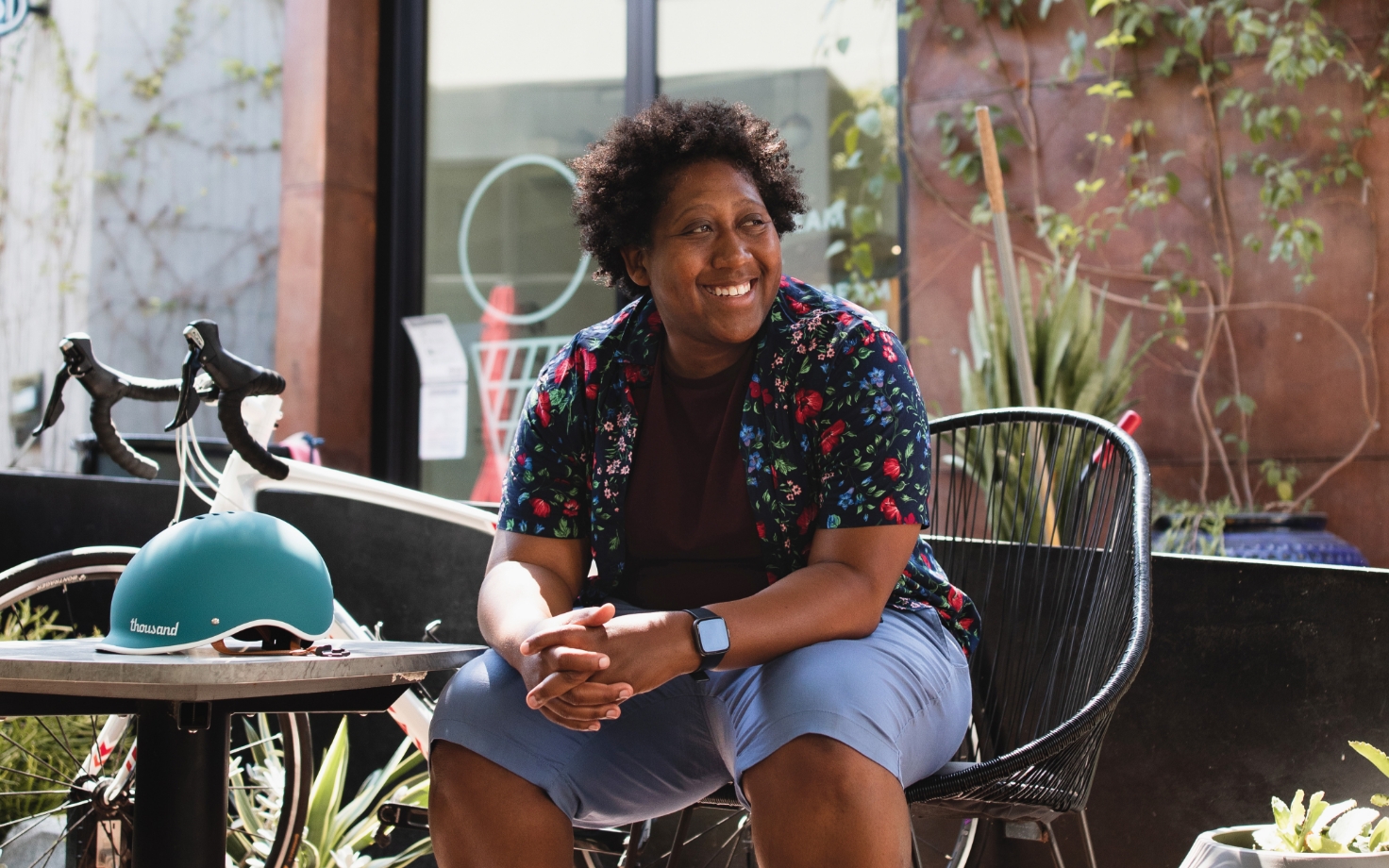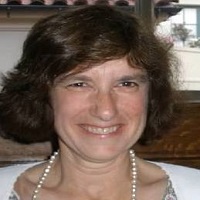Dignity is an important principle for Tamika Butler.
She views dignity as “an inherent right,” one that should guide transportation planning — but often does not.
Dignity means bus stops that have benches and shade trees because waiting for a bus in the 100-degree heat of a San Fernando Valley summer “is not a dignified experience,” she said, especially for riders who rely on public transit.
It also means treating unhoused bus or train riders first, with help and compassion instead of “criminalizing” them by immediately deploying police officers.
Rather than seeing transit planning as a series of zero-sum decisions — cars versus buses, bicycles versus pedestrians — Butler and other young leaders aim to “center planning not just on people who take transit as a lifestyle decision but on people who need transit.”
“Those residents,” she said, “should have the flexibility and freedom and just as full a life in the region as if they had a car.”
A Stanford-trained lawyer and now a Ph.D. student at the Luskin School of Public Affairs, Butler thinks about transportation in new and provocative ways, and has emerged as an influential thinker, speaker and writer with a national reputation. She consults with various local agencies on transportation matters and is considered one of the region’s genuinely original thinkers in this field.
As a Black and queer woman, a mother, a wife, an ardent cyclist and a conservationist, Butler’s life has colored her views on transportation planning, said Seleta Reynolds, L.A. Metro’s chief innovation officer. The two women first met eight years ago when Butler headed the Los Angeles County Bicycle Coalition. Reynolds is now an admirer and a friend.
“Tamika really doesn’t think of transportation in two dimensions — not just what’s happening in the public right-of-way,” said Reynolds, and those views have sparked controversy.
Butler sees “all the different experiences of people moving through public spaces, as well as the role of law enforcement, transit officials, culture and community. All of it interests her,” said Reynolds — and those interests are frequently leavened by Butler’s hearty laugh.
“She’s been the tip of the spear for a lot of difficult conversations,” Reynolds said, “and she’s paid a high price.” Yet Butler steadfastly believes that we can do better.
Finding activism
Born in Alamogordo, New Mexico, where her Air Force father was stationed, Butler grew up a “military kid” in Okinawa, Crete and Las Vegas. She and her family moved to Nebraska, where her parents met and her extended family still lives, just before she started high school. She earned her undergraduate degree at Creighton University in Omaha. There, she found her purpose in activism.
“A lot of the way I think of public service,” she said, “is due to my Jesuit education there.”
When her parents nudged her toward law, Butler applied to 25 law schools around the country. But while visiting Stanford she decided “then and there” to reject any other offers of admission. Stanford, she said, was the “the first place that I felt I could be my full self, not just the country bumpkin.”
Butler now even admits to liking vegetables in addition to her Midwesterner’s fondness for meat and potatoes.
Following graduation, she practiced employment law for a few years with the Legal Aid Society in the San Francisco Bay Area. She moved to Los Angeles in 2015 to be with her wife, a lawyer working for a large firm. The couple, who live in the View Park neighborhood, now have two young children.
She marked her 40th birthday in July while recovering from COVID-19, watching “Bluey” cartoons on repeat with her kids.
As executive director of the L.A. Bike Coalition, one of her first jobs in L.A., Butler “fell in love with urban planning,” she recalled. “For the first time I had a job where I felt joy that my wife feels in her job.”
Other advocacy positions with the Los Angeles Neighborhood Land Trust and other nonprofits followed.
In the process, she gained a reputation as a consensus builder, a nimble speaker, and a fierce advocate for racial equity and inclusion, particularly on transportation-related issues.
In addition to her Luskin studies, Butler now runs her own consulting firm for public, private and nonprofit sector clients, focusing on climate and transportation issues along with diversity and inclusion training.
‘A really special collaborator’
She decided on graduate study during a stint with a design and planning firm.
“Getting my Ph.D. was my overreaction” to a comment from a client that Butler needed stronger academic training to bolster a report that she had drafted.
She is honing her analytic skills at Luskin. Working with UCLA’s Madeline Brozen, deputy director of the Lewis Center for Regional Policy Studies, Butler is helping to evaluate a “mobility wallet” pilot program. A joint effort by L.A. Metro and the L.A. Department of Transportation, the pilot provides up to $1,800 annually in the form of prepaid debit cards that qualified participants can use on buses, rail, ride and bike share and more. The goal is to improve access to transportation in the region. Participants must have an income below certain limits to qualify.
“Tamika is a really special collaborator, because she has such varied transportation experience,” Brozen said, “and she just connects with people very well. “She’s also just fun to work with.”
Butler’s Luskin classmate, Sam Speroni, credits her with broadening his intellectual aperture.
A former high school English teacher, Speroni didn’t intend to study the intersection of education and transportation, but he quickly saw important equity issues that “weren’t in the spotlight.”
Unlike many other states, California does not require school districts to provide transportation for students. Until recently, the state also provided districts with relatively little funding for it. Even with a 2022 expansion in state funding for student transportation, more kids in California depend on parents driving them in the family car than in most other states, Speroni said.
“Tamika helped bring those equity issues into sharper focus for me,” he said, adding that he believes his teaching experience has been useful to her.
“Tamika is deeply curious,” Speroni said. “I don’t know that Tamika needed a Ph.D. to be a transportation advocate.” What sets her apart, he said, is that she she wanted to learn about how to do the research. “That’s rare for people to do both at that high level.”
Transportation as experience, not just design
Much of Butler’s advocacy is guided by a belief that transportation policy is a prism through which we can see other all social justice issues, an insight she attributes to former L.A. Mayor Eric Garcetti.
Think of the transportation infrastructure — the trains, buses and stations as well as the streets, sidewalks and bike lanes — as a “commons,” she said.
How, for example, should we allocate the 80 feet or so of asphalt on a city street? Where do the lines go for cyclists, drivers and pedestrians who use that space in different ways?
Or, instead of deciding who we should keep out of light rail stations, we should aim to serve residents with more frequent trains and modern and reliably clean restrooms. Mental healthcare workers could be present there as well, along with those who can help connect people with housing, jobs and health care.
She argues that transit planning has traditionally been the province of “a certain person — White dudes of means, without disabilities, engineers.”
In all of that, Butler challenges the notion that planners should just confine themselves to design, Metro’s Reynolds said. “She wants us to think about the lived experience of the people in the community that we are there to serve.”
That means responding to the needs of community members — “the grandmother sitting on her front porch who can tell you everything about people who run that stop sign.” And when a driver runs over a pedestrian and the TV cameras arrive, Butler said, “She tells the reporters, ‘We’ve been saying there’s no crosswalk here to make it to the bus stop.’”
Butler outlined these views at a national conference of urban transportation officials in 2016 in the shadow of the killings of Tamir Rice and Trayvon Martin. She also called for a broader tolerance for cyclists, unable to afford a car, who need to bike to work. Often these are immigrants and African Americans whose presence in White neighborhoods has stoked fear and, she argued, sometimes resulted in arrest for behavior that when committed by White cyclists has not triggered a similar police response.
Butler received a standing ovation, but her comments prompted several attendees to walk out. Angry social media posts targeted her then and in response to speeches she has given since.
She stood her ground and has continued, even redoubled, her determination to infuse discussions about transportation with an emphasis on the social justice implications of those decisions.
But is the transit future she envisions realistic in an era of persistent public budget cuts? In a region stuck for decades in a long-running debate about freeways and public transit, is it possible to think more broadly and comprehensively about transit solutions and their relationship to social justice?
“It’s absolutely possible,” said Butler. “I’m a Black person in America. There’s a lot that shouldn’t be possible and that my ancestors worked to achieve.”

























